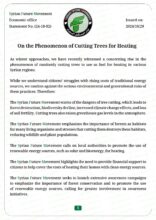Refugees and Their Role in Revitalizing the Syrian Economy

Introduction:
Syrian refugees play an essential role in Syria’s economic revival post-conflict, but what about their contributions before the end of the conflict? Here are some key points demonstrating how refugees can support the Syrian economy:
- Skills and Expertise: Many Syrian refugees have acquired new skills and expertise during their displacement, whether in host countries or through training programs and small projects they manage. These skills can be valuable for rebuilding the Syrian economy.
- Investment in Reconstruction: Some refugees may have the potential to attract investments or even invest in reconstruction projects themselves, thereby stimulating economic growth and creating new job opportunities.
- Workforce Contributions: Refugees can help fill gaps in the Syrian labor market, especially in sectors needing skilled and unskilled labor, which can expedite the rebuilding process and improve productivity.
- Trade and Business: Refugees managing small businesses in host countries may transfer these businesses to Syria, boosting commercial activity and contributing to economic diversification.
- Education and Training Programs: The education and training that refugees received could help improve education and vocational training levels in Syria, enhancing the workforce’s ability to meet the changing market needs.
To achieve these benefits, there must be supportive policies from the Syrian government and the international community to facilitate the return of refugees and provide a stable and secure environment for them.
Challenges and Difficulties:
The return of Syrian refugees and their positive impact on the economy face numerous challenges and difficulties, including:
- Safety and Security: Many refugees fear returning due to security concerns such as arbitrary arrests, torture, and enforced disappearances. Human rights reports indicate that returnees face significant risks to their lives and safety.
- Economic Conditions: The Syrian economy is severely deteriorated, making it difficult for returnees to secure basic needs such as housing, food, and employment.
- Destroyed Infrastructure: The war has destroyed much of Syria’s infrastructure, including homes, schools, and hospitals, making it challenging for returnees to rebuild their lives.
- Severe Shortage of Basic Services: Essentials such as electricity, water, and healthcare are lacking, making daily life difficult for returnees.
- Psychological and Social Pressures: Returnees face significant psychological and social challenges, including adapting to life in a devastated environment and restoring social ties that may have been damaged by the conflict.
- Legal and Administrative Restrictions: Some refugees struggle to retrieve official documents or register their properties, complicating the process of return and resettlement.
These and other challenges make the return of refugees to Syria a complex and difficult process, requiring significant efforts from the international community and, particularly, the Syrian regime to provide a safe and stable environment for returnees.
Contribution from Abroad:
Syrian refugees can contribute to the economy without the need to return to Syria through several ways:
- Working in Host Countries: Many refugees work in sectors such as construction, agriculture, and healthcare in host countries. If managed through structured national partnerships, this can benefit the local economy by increasing productivity and meeting labor market needs.
- Managing Small Businesses: Some refugees run small businesses, like shops and factories, through partners within Syria in addition to projects in host countries. This helps create new job opportunities and stimulates economic activity in host communities, which could serve as a valuable model to highlight.
- Education and Training: Refugees who receive education and training in host countries can transfer these skills to their communities, enhancing their capabilities and contributing to long-term economic development.
- Financial Remittances: Refugees working abroad send financial remittances to their families in Syria, which helps support the local economy and meet basic household needs.
- Engagement in Trade: Some refugees participate in trade between host countries and Syria, strengthening trade relations and contributing to the economic growth of both economies.
These efforts can have significant positive impacts on the economy, both in host countries and in Syria in the long term. There are also several additional ways through which Syrian refugees can contribute to the Syrian economy without the need for an immediate return:
- Remote Work: Refugees with skills in fields like information technology, design, and writing can work remotely for Syrian companies or development projects, thereby contributing to the local economy without needing to be physically present in Syria.
- Online Education and Training: Refugees can also provide online training and educational courses to Syrians within the country, helping to improve the skills and knowledge of the local workforce.
- Investment in Small Projects: This is highly recommended, as refugees with financial means can invest in small projects within Syria, either directly or through partnerships with local entrepreneurs, creating new job opportunities and stimulating economic growth.
- Networking and Connections: Refugees can use their international networks to attract investments and aid to Syria, as well as strengthen trade relations between Syria and host countries.
- Participation in NGOs: Refugees can work with NGOs focused on reconstruction and development in Syria, helping to improve the living and economic conditions of Syrians within the country.
These efforts can have significant positive impacts on the Syrian economy, even under the current difficult circumstances. Therefore, in the Economic Office of the Syrian Future Movement, we strive to highlight this important aspect.
The Role of De Facto Authorities:
It is also important to pay attention to the role of the de facto authorities in Syria. Enabling refugees to contribute to economic recovery, free from any political exploitation, requires several steps and measures:
- Providing Security: The authorities must ensure a safe and stable environment for returnees, as security is the primary factor encouraging refugees to return and contribute to rebuilding the economy.
- Investing in Rebuilding Essential Infrastructure: This includes roads, schools, and hospitals, facilitating returnees in restarting their lives and contributing to the local economy.
- Simplifying Legal and Administrative Procedures: This involves restoring official documents and registering properties, helping refugees quickly regain their rights and possessions.
- Providing Financial and Technical Support: For small and medium-sized projects run by refugees, enhancing their ability to create new job opportunities and stimulate economic growth. We have previously presented a study in our office worth reviewing for those interested, titled: “Small Projects: An Overlooked Necessity.”
- Offering Educational and Training Programs: To equip refugees with the necessary skills for the labor market, increasing their chances of obtaining jobs and contributing to improved productivity.
- Collaborating with International Organizations: To provide the necessary financial and technical support for reconstruction and development programs, ensuring the sustainability of efforts in this field.
These measures are essential and can significantly contribute to empowering refugees to play an active role in reviving the Syrian economy.
Conclusion:
The Syrian crisis has posed a significant challenge on all levels, including the economy. However, the return of Syrian refugees to their homeland holds great potential for revitalizing and stimulating the economy.
The return of Syrian refugees to their homeland represents a real opportunity to rebuild Syria and develop its economy. However, this process requires the concerted efforts and cooperation of all concerned parties, whether governmental, international, or civil society.
It is also essential that the benefits for refugees be prioritized in the current context, focusing on involving them in driving the economic engine in Syria. If given governmental attention from the de facto authorities, much of the economic injustice facing our people within Syria can be alleviated.
Economic Office
Research Team
Research and Studies Department
Studies
Syrian Future Movement
References:
- التمكين الاقتصادي للاجئين السوريين – مركز حرمون للدراسات المعاصرة.
- قدرة اللاجئين السوريين على العودة الى ديارهم: تحليل اقتصادي واجتماعي.
- World Economic Forum.
- How refugees can contribute to Syria’s future | World Economic Forum.
- Economic Burden or Opportunity? How Syrian Refugees Can Contribute to ….
- The economic impacts of the Syrian refugee migration on Jordan: A trade ….
- حياة أشبه الموت”: عودة اللاجئين السوريين من لبنان والأردن | HRW.
- ما الذي يعيق عودة اللاجئين السوريين من لبنان لبلدهم؟.
- عالقون بين حربين… الخطر المحدق بعودة اللاجئين السوريين من لبنان.
- بعد تصاعد الحديث عن إعادتهم.. هل يرجع اللاجئون السوريون إلى بلدهم ….
- اللاجئون السوريون: هل باتت الظروف مواتية لعودتهم من لبنان إلى بلادهم ….
- المشاريع الصغيرة حاجةٌ متروكة” في:






